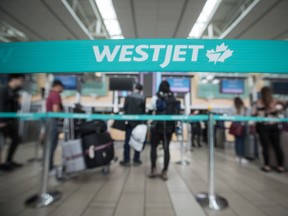Omicron and bad weather set to disrupt Canadians’ travel plans for weeks

It’s not just COVID-19 throwing a wrench in the holiday travel season

Article content
Canada’s battered airline industry is set to face more disruption in the coming weeks as a combination of Omicron variant and bad weather conspire to dash the plans of air travellers.
Article content
WestJet Airlines announced on Dec. 30 it would consolidate approximately 15 per cent of scheduled flights through to Jan. 31, due to staffing shortages. Currently, the airline has 181 workers infected with COVID-19, part of a 35 per cent increase in active cases in recent days, spokesperson Morgan Bell said by email.
Flair Airlines, a budget airliner, will also see its flight schedule disrupted , CEO and president Stephen Jones said by phone on Dec. 31. The Edmonton-based air carrier is projecting it will have to cancel up to 15 per cent of its flights in January as it grapples with surging cases of the virus among staff, third-party workers at airports and across the country.
“We have definitely seen an increase in sick calls from our crew,” Jones said. “The numbers have really stepped up in the last day or two and so unfortunately, we are conscious of that impacting our guests’ travel plans. We’re very sorry for that.”
Article content
Flair has had a range of five to 15 flight cancellations over the past week due to inadequate staffing, Jones said. The airline is currently collecting information on how many Flair workers are out sick due to the virus, a spokesperson said.
Jones said customers who are facing cancellations will be contacted by the airline and dealt with according to its policy and the law.
It’s not just COVID-19 throwing a wrench in the holiday travel season. Inclement weather out west with heavy snow and a deep freeze across the Prairies has presented another challenge for air carriers. In a statement, Air Canada said four per cent of its flights “affected” this week are primarily due to weather, and it is automatically rebooking customer flights to travel within 24 hours.
Article content
On Thursday, Vancouver International was reporting departure delays to start the day and urged travellers to check with their airline and allow plenty of time to reach the airport.
The Omicron variant is just the latest blow for the Canadian airline industry that has suffered heavy losses due to stringent travel restrictions imposed by the Canadian government since the first outbreak of the COVID-19 virus in early 2020.
Across the border, flight cancellations have been more severe. Delta Air Lines, United Airlines and others have cancelled hundreds of flights over the past few days as the virus spreads through airplane cabins and check-in lines, disrupting thousands of people’s travel plans.
In Canada, Omicron has become the dominant strain in several provinces, including British Columbia, Quebec and Ontario. Quebec reinstated province-wide curfews as it deals with more than 16,400 cases of the virus. Ontario, with more than 16,700 cases, will no longer provide PCR tests to the public, instead offering it only to a select group of high-risk populations as its testing capacity is pushed to the limits.
Canada’s air traffic recovery had already been lagging the U.S. even before the highly contagious variant emerged. Traffic at Canadian airport security checkpoints was 53 per cent of 2019 levels in the first 19 days of December — the most recent numbers available — versus 84 per cent in the U.S., according to data from transport security authorities.
Earlier in December, the Public Health Agency of Canada had advised travellers, regardless of their vaccination status, to avoid non-essential travel internationally.
With a file from Bloomberg News




